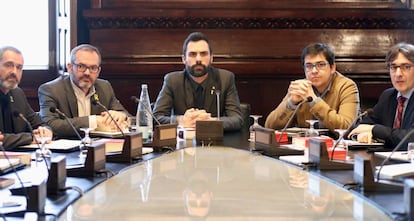Catalan parliament will meet on Wednesday to debate crisis
Separatists want to defend “political rights;” pro-unity Socialists call for a national unity government

Political reaction to Puigdemont’s arrest in Germany continued throughout Monday in Spain.
After meeting with members of the parliament’s governing board, Speaker Roger Torrent, of the separatist Catalan Republican Left (ERC) party, announced that the chamber will hold a special session at 10am on Wednesday to discuss the next moves.
Government reaction
Interior Minister Juan Ignacio Zoido said on Monday that the Catalan separatist leaders currently in custody “are there not because of their ideas, but because of their serious acts, of which they were repeatedly warned by the justice system.”
Deputy Prime Minister Soraya Sáenz de Santamaría said that Puigdemont’s arrest is “good news” because it proves that institutions “are working,” that “we are all equal before the law and that nobody can keep laughing at the justice system indefinitely.”
Gerard Gómez, an ERC deputy, said in an afternoon press conference that the session will address “the extreme difficulty of the current situation.”
“Puigdemont was arrested in Germany yesterday. Faced with this intolerable situation, we have called a plenary session to discuss it,” he added. “The session is to defend the political rights of all deputies and to achieve an investiture as soon as possible.”
The request for a special session was made by the separatist parties that hold a slim majority in the Catalan parliament following the snap election of December 21. The three candidates to the premiership that separatists have put forward so far have all failed in their bid – Puigdemont, grassroots activist Jordi Sànchez and former government spokesman Jordi Turull.
Investiture debates
Parliamentary rules indicate that candidates need to physically attend the investiture sessions in order to be voted in, which made remote appointment impossible for the Brussels-based Puigdemont.
Jordi Sànchez was in pre-trial custody and the judge denied his request for permission to attend the session. Jordi Turull, who was out on bail, did attend the session but failed to secure the support of a small but necessary separatist party, and by the time the second vote came around two days later he was already in pre-trial detention in connection with a probe into rebellion and misuse of public funds during the independence bid.
“No judge has the legitimacy to persecute the president of all Catalans. The State is attacking the heart of democracy and putting at risk the values that Europe was built on,” said Torrent on Sunday following news of Puigdemont’s arrest.
Inés Arrimadas, leader of the Catalan branch of Ciudadanos, which won the most votes at the December elections, replied that “in all democracies, officials and politicians submit to the law and to the courts. The EU was founded to overcome nationalism.”
In the meantime, other pro-unity parties sought their own solutions out of the political deadlock, which could lead to fresh elections if a valid candidate is not found within two months.
The head of the Catalan Socialist Party (PSC), Miquel Iceta, on Monday suggested the need for a national unity government in Catalonia where all parties would be represented. “National unity governments are there for exceptional situations, and I can’t think of a more exceptional situation than this one,” he said.
“I believe in a great basic agreement among all political parties to get out of this exceptional situation. The only red line is respect for the rule of law,” added Xavier García-Albiol, head of the Catalan Popular Party (PPC).
English version by Susana Urra.
Tu suscripción se está usando en otro dispositivo
¿Quieres añadir otro usuario a tu suscripción?
Si continúas leyendo en este dispositivo, no se podrá leer en el otro.
FlechaTu suscripción se está usando en otro dispositivo y solo puedes acceder a EL PAÍS desde un dispositivo a la vez.
Si quieres compartir tu cuenta, cambia tu suscripción a la modalidad Premium, así podrás añadir otro usuario. Cada uno accederá con su propia cuenta de email, lo que os permitirá personalizar vuestra experiencia en EL PAÍS.
¿Tienes una suscripción de empresa? Accede aquí para contratar más cuentas.
En el caso de no saber quién está usando tu cuenta, te recomendamos cambiar tu contraseña aquí.
Si decides continuar compartiendo tu cuenta, este mensaje se mostrará en tu dispositivo y en el de la otra persona que está usando tu cuenta de forma indefinida, afectando a tu experiencia de lectura. Puedes consultar aquí los términos y condiciones de la suscripción digital.








































